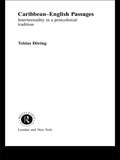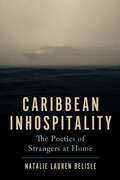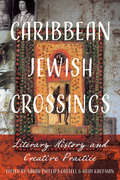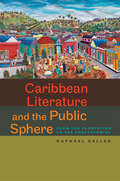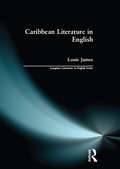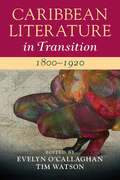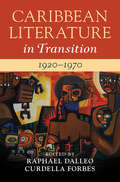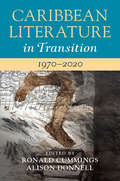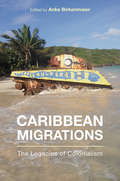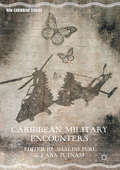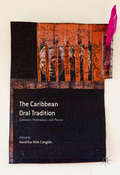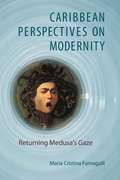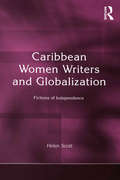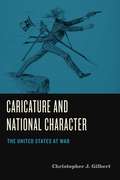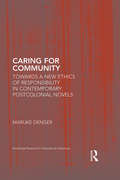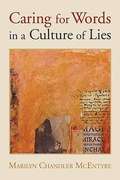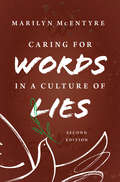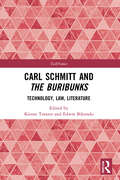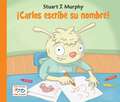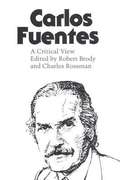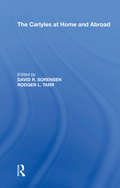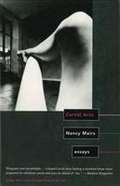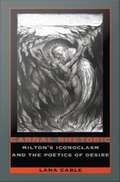- Table View
- List View
Caribbean-English Passages: Intertexuality in a Postcolonial Tradition (Routledge Research in Postcolonial Literatures)
by Tobias DöringTobias Döring uses Postcolonialism as a backdrop to examine and question the traditional genres of travel writing, nature poetry, adventure tales, autobiography and the epic, assessing their relevance to, and modification by, the Caribbean experience. Caribbean-English Passages opens an innovative and cross-cultural perspective, in which familiar oppositions of colonial/white versus postcolonial/black writing are deconstructed. English identity is thereby questioned by this colonial contact, and Caribbean-English writing radically redraws the map of world literature. This book is essential reading for students of Postcolonial Literature at both undergraduate and postgraduate level.
Caribbean Inhospitality: The Poetics of Strangers at Home (Critical Caribbean Studies)
by Natalie Lauren BelisleThe Caribbean has a global reputation for extending unparalleled hospitality to foreign guests. Yet local citizens express feeling alienated from the Caribbean nations they call home. Here, Natalie Lauren Belisle probes the relationship between these incompatible narratives of Caribbean life. Departing from tourist-centered critiques of the Caribbean’s visitor economy, Belisle instead gives primacy to the political life of the Caribbean citizen-subject within a broader hospitality regime. Reading literary, cinematic, and digital texts that traverse the Spanish, Anglophone, and Francophone Caribbean, Belisle interprets citizens’ estrangement through misdirected political deliberation and demonstrates that inhospitality is institutionalized through the aesthetic, reproducing itself in the laws that condition belonging and membership in the nation-state. Ultimately, Caribbean Inhospitality recasts the decay of nation/state sovereignty in the postcolonial Caribbean within the contours of neoliberalism, international relations, and cosmopolitanism.
Caribbean Jewish Crossings: Literary History and Creative Practice (New World Studies)
by Ruth Behar Alessandra Benedicty-Kokken Bryan Cheyette Sarah Phillips Casteel Natalie Zemon Davis Neil R. Davison David Gantt Gurley Kathleen Gyssels Anna Ruth Henriques Heidi Kaufman Cynthia McLeod Ineke Phaf-Rheinberger Caryl Phillips Ben Ratskoff Rachel Rubinstein Efraim Sicher Leonard Stein Linda WeinhouseCaribbean Jewish Crossings is the first essay collection to consider the Caribbean's relationship to Jewishness through a literary lens. Although Caribbean novelists and poets regularly incorporate Jewish motifs in their work, scholars have neglected this strain in studies of Caribbean literature.The book takes a pan-Caribbean approach, with chapters addressing the Anglophone, Francophone, Hispanophone, and Dutch-speaking Caribbean. Part 1 traces the emergence of a Caribbean-Jewish literary culture in Suriname, St. Thomas, Jamaica, and Cuba from the late eighteenth century through the early twentieth century. Part 2 brings into focus Sephardic and crypto-Jewish motifs in contemporary Caribbean literature, while Part 3 turns to the question of colonialism and its relationship to Holocaust memory. The volume concludes with the compelling voices of contemporary Caribbean creative writers.
Caribbean Literature and the Public Sphere: From the Plantation to the Postcolonial (New World Studies)
by Raphael DalleoBringing together the most exciting recent archival work in anglophone, francophone, and hispanophone Caribbean studies, Raphael Dalleo constructs a new literary history of the region that is both comprehensive and innovative. He examines how changes in political, economic, and social structures have produced different sets of possibilities for writers to imagine their relationship to the institutions of the public sphere. In the process, he provides a new context for rereading such major writers as Mary Seacole, José Martí, Jacques Roumain, Claude McKay, Marie Chauvet, and George Lamming, while also drawing lesser-known figures into the story. Dalleo's comparative approach will be important to Caribbeanists from all of the region's linguistic traditions, and his book contributes even more broadly to debates in Latin American and postcolonial studies about postmodernity and globalization.
Caribbean Literature in English (Longman Literature In English Series)
by Louis JamesCaribbean Literature in English places its subject in its precise regional context. The `Caribbean', generally considered as one area, is highly discrete in its topography, race and languages, including mainland Guyana, the Atlantic island of Barbados, the Lesser Antilles, Trinidad, and Jamaica, whose size and history gave it an early sense of separate nationhood. Beginning with Raleigh's Discoverie of...Guiana (1596), this innovative study traces the sometimes surprising evolution of cultures which shared a common experience of slavery, but were intimately related to individual local areas. The approach is interdisciplinary, examining the heritage of the plantation era, and the issues of language and racial identity it created.From this base, Louis James reassesses the phenomenal expansion of writing in the contemporary period. He traces the influence of pan-Caribbean movements and the creation of an expatriate Caribbean identity in Britain and America: `Brit'n' is considered as a West Indian island, created by `colonization in reverse'. Further sections treat the development of a Caribbean aesthetic, and the repossession of cultural roots from Africa and Asia. Balancing an awareness of the regional identity of Caribbean literature with an exploration of its place in world and postcolonial literatures, this study offers a panoramic view that has become one of the most vital of the `new literatures in English'.This accessible overview of Caribbean writing will appeal to the general reader and student alike, and particularly to all who are interested in or studying Caribbean literatures and culture, postcolonial studies, Commonwealth 'new literatures' and contemporary literature and drama.
Caribbean Literature in Transition, 1800–1920: Volume 1 (Caribbean Literature in Transition)
by Tim Watson Evelyn O’CallaghanThis volume examines what Caribbean literature looked like before 1920 by surveying the print culture of the period. The emphasis is on narrative, including an enormous range of genres, in varying venues, and in multiple languages of the Caribbean. Essays examine lesser-known authors and writing previously marginalized as nonliterary: popular writing in newspapers and pamphlets; fiction and poetry such as romances, sentimental novels, and ballads; non-elite memoirs and letters, such as the narratives of the enslaved or the working classes, especially women. Many contributions are comparative, multilingual, and regional. Some infer the cultural presence of subaltern groups within the texts of the dominant classes. Almost all of the chapters move easily between time periods, linking texts, writers, and literary movements in ways that expand traditional notions of literary influence and canon formation. Using literary, cultural, and historical analyses, this book provides a complete re-examination of early Caribbean literature.
Caribbean Literature in Transition, 1920–1970: Volume 2 (Caribbean Literature in Transition)
by Raphael Dalleo Curdella ForbesThe years between the 1920s and 1970s are key for the development of Caribbean literature, producing the founding canonical literary texts of the Anglophone Caribbean. This volume features essays by major scholars as well as emerging voices revisiting important moments from that era to open up new perspectives. Caribbean contributions to the Harlem Renaissance, to the Windrush generation publishing in England after World War II, and to the regional reverberations of the Cuban Revolution all feature prominently in this story. At the same time, we uncover lesser known stories of writers publishing in regional newspapers and journals, of pioneering women writers, and of exchanges with Canada and the African continent. From major writers like Derek Walcott, V.S. Naipaul, George Lamming, and Jean Rhys to recently recuperated figures like Eric Walrond, Una Marson, Sylvia Wynter, and Ismith Khan, this volume sets a course for the future study of Caribbean literature.
Caribbean Literature in Transition, 1970–2020: Volume 3 (Caribbean Literature in Transition)
by Ronald Cummings Alison DonnellThe period from the 1970s to the present day has produced an extraordinarily rich and diverse body of Caribbean writing that has been widely acclaimed. Caribbean Literature in Transition, 1970-2020 traces the region's contemporary writings across the established genres of prose, poetry, fiction and drama into emerging areas of creative non-fiction, memoir and speculative fiction with a particular attention on challenging the narrow canon of Anglophone male writers. It maps shifts and continuities between late twentieth century and early twenty-first century Caribbean literature in terms of innovations in literary form and style, the changing role and place of the writer, and shifts in our understandings of what constitutes the political terrain of the literary and its sites of struggle. Whilst reaching across language divides and multiple diasporas, it shows how contemporary Caribbean Literature has focused its attentions on social complexity and ongoing marginalizations in its continued preoccupations with identity, belonging and freedoms.
Caribbean Migrations: The Legacies of Colonialism (Critical Caribbean Studies)
by Anke BirkenmaierWith mass migration changing the configuration of societies worldwide, we can look to the Caribbean to reflect on the long-standing, entangled relations between countries and areas as uneven in size and influence as the United States, Cuba, Hispaniola, Puerto Rico, and Jamaica. More so than other world regions, the Caribbean has been characterized as an always already colonial region. It has long been a key area for empires warring over influence spheres in the new world, and where migration waves from Africa, Europe, and Asia accompanied every political transformation over the last five centuries. In Caribbean Migrations, an interdisciplinary group of humanities and social science scholars study migration from a long-term perspective, analyzing the Caribbean’s “unincorporated subjects” from a legal, historical, and cultural standpoint, and exploring how despite often fractured public spheres, Caribbean intellectuals, artists, filmmakers, and writers have been resourceful at showcasing migration as the hallmark of our modern age.
Caribbean Military Encounters (New Caribbean Studies)
by Shalini Puri Lara PutnamThis book provides a much-needed study of the lived experience of militarization in the Caribbean from 1914 to the present. It offers an alternative to policy and security studies by drawing on the perspectives of literary and cultural studies, history, anthropology, ethnography, music, and visual art. Rather than opposing or defending militarization per se, this book focuses attention on how Caribbean people negotiate militarization in their everyday lives. The volume explores topics such as the US occupation of Haiti; British West Indians in World War I; the British naval invasion of Anguilla; military bases including Chaguaramas, Vieques and Guantánamo; the militarization of the police; sex work and the military; drug wars and surveillance; calypso commentaries; private security armies; and border patrol operations.
The Caribbean Oral Tradition: Literature, Performance, and Practice
by Hanétha Vété-CongoloThe book uses an innovative prism of interorality that powerfully reevaluates Caribbean orality and innovatively casts light on its overlooked and fundamental epistemological contribution into the formation of Caribbean philosophy. It defines the innovative prism of interorality as the systematic transposition of previously composed storytales into new and distinct tales. The book offers a powerful consideration of the interconnections between Caribbean orality and Caribbean philosophy, especially as this pertains to aesthetics and ethics. This is a new area of thought, a new methodological approach and a new conceptual paradigm and proposition to scholars, students, writers, artists and intellectuals who conceive and examine intellectual and cultural productions in the Black Atlantic world and beyond.
Caribbean Perspectives on Modernity
by Maria Cristina FumagalliTaking up the challenge of redefining modernity from a Caribbean perspective instead of assuming that the North Atlantic view of modernity is universal, Maria Cristina Fumagalli shows how the Caribbean's contributions to the modern world not only provide a more accurate account of the past but also have the potential to change the way in which we imagine the future. Fumagalli uses the myth of Medusa's gaze turning people into stone to describe the way North Atlantic modernity freezes its "others" into a state of perpetual backwardness that produces an ethnocentric narrative based on homogenization, vilification, and disempowerment that actively ignores what fails to conform to the story it wants to tell about itself. In analyzing narratives of modernity that originate in the Caribbean, the author explores the region's refusal to succumb to Medusa's spell and highlights its strategies to outstare the Gorgon.Reflecting a diversity of texts, genres, and media, the chapters focus on sixteenth-century engravings and paintings from the Netherlands and Italy, a scientific romance produced at the turn of the twentieth century by the king of the Caribbean island Redonda, contemporary collections of poetry from the anglophone Caribbean, a historical novel by the Guadeloupean writer Maryse Condé, a Latin epic, a Homeric hymn, ancient Egyptian rites, fairy tales, romances from England and Jamaica, a long narrative poem by the Nobel Prize winner Derek Walcott, and paintings by artists from Europe and the Americas spanning the seventeenth century to the present. Caribbean Perspectives on Modernity offers an original and creative contribution to what it means to be modern.
Caribbean Women Writers and Globalization: Fictions of Independence
by Helen C. ScottCaribbean Women Writers and Globalization offers a fresh reading of contemporary literature by Caribbean women in the context of global and local economic forces, providing a valuable corrective to much Caribbean feminist literary criticism. Departing from the trend towards thematic diasporic studies, Helen Scott considers each text in light of its national historical and cultural origins while also acknowledging regional and international patterns. Though the work of Caribbean women writers is apparently less political than the male-dominated literature of national liberation, Scott argues that these women nonetheless express the sociopolitical realities of the postindependent Caribbean, providing insight into the dynamics of imperialism that survive the demise of formal colonialism. In addition, she identifies the specific aesthetic qualities that reach beyond the confines of geography and history in the work of such writers as Oonya Kempadoo, Jamaica Kincaid, Edwidge Danticat, Pauline Melville, and Janice Shinebourne. Throughout, Scott's persuasive and accessible study sustains the dialectical principle that art is inseparable from social forces and yet always strains against the limits they impose. Her book will be an indispensable resource for literature and women's studies scholars, as well as for those interested in postcolonial, cultural, and globalization studies.
Caricature and National Character: The United States at War (Humor in America #1)
by Christopher J. GilbertAccording to the popular maxim, a nation at war reveals its true character. In this incisive work, Chris Gilbert examines the long history of US war politics through the lens of political cartoons to provide new, unique insights into American cultural identity.Tracing the comic representation of American values from the First World War to the War on Terror, Gilbert explores the power of humor in caricature to expose both the folly in jingoistic virtues and the sometimes-strange fortune in nationalistic vices. He examines the artwork of four exemplary American cartoonists—James Montgomery Flagg, Dr. Seuss, Ollie Harrington, and Ann Telnaes—to craft a trenchant image of Americanism. These examinations animate the rhetorical, and indeed comic, force of icons like Uncle Sam, national symbols like the American Eagle, political stooges like President Donald J. Trump, and more, as well as the power of political cartoons to comment on issues of race, class, and gender on the home front. Throughout, Gilbert portrays a US culture rooted in and riven by ideas of manifest destiny, patriotism, and democracy for all, yet plagued by ugly forms of nationalism, misogyny, racism, and violence.Rich with examples of hilarious and masterfully drawn caricatures from a diverse range of creators, this unflinching look at the evolution of our conflicted national character illustrates how American cartoonists use farce, mockery, and wit to put national character in the comic looking glass.
Caricature and National Character: The United States at War (Humor in America)
by Christopher J. GilbertAccording to the popular maxim, a nation at war reveals its true character. In this incisive work, Chris Gilbert examines the long history of US war politics through the lens of political cartoons to provide new, unique insights into American cultural identity.Tracing the comic representation of American values from the First World War to the War on Terror, Gilbert explores the power of humor in caricature to expose both the folly in jingoistic virtues and the sometimes-strange fortune in nationalistic vices. He examines the artwork of four exemplary American cartoonists—James Montgomery Flagg, Dr. Seuss, Ollie Harrington, and Ann Telnaes—to craft a trenchant image of Americanism. These examinations animate the rhetorical, and indeed comic, force of icons like Uncle Sam, national symbols like the American Eagle, political stooges like President Donald J. Trump, and more, as well as the power of political cartoons to comment on issues of race, class, and gender on the home front. Throughout, Gilbert portrays a US culture rooted in and riven by ideas of manifest destiny, patriotism, and democracy for all, yet plagued by ugly forms of nationalism, misogyny, racism, and violence.Rich with examples of hilarious and masterfully drawn caricatures from a diverse range of creators, this unflinching look at the evolution of our conflicted national character illustrates how American cartoonists use farce, mockery, and wit to put national character in the comic looking glass.
Caring for Community: Towards a New Ethics of Responsibility in Contemporary Postcolonial Novels (Routledge Research in Postcolonial Literatures)
by Marijke DengerCaring for Community: Towards a New Ethics of Responsibility in Contemporary Postcolonial Novels focuses on four highly acclaimed publications in order to argue for a new understanding of community and its ethical framework in recent literary texts. Traditionally, community has been understood to function on the basis of individuals’ readiness to establish relationships of reciprocal responsibility. This book, however, argues that community and non-reciprocity need not be mutually exclusive categories. Examining works by leading contemporary postcolonial authors and reading them against Judith Butler’s post-9/11 concept of global political community, the book explores how concrete acts of responsibility can be carried out in recognition of various others, even and precisely when those others cannot be expected to respond. The literary analyses draw on a rich theoretical framework that includes approaches to care, hospitality and the ethical encounter between self and other. Overall, this book establishes that the novels’ protagonists, by investing in an ethics of responsibility that does not require reciprocity, acquire the agency to envisage new forms of community. By reflecting on the nature and effect of this agency and its representation in contemporary literary texts, the book also considers the role of postcolonial studies in addressing highly topical questions regarding our co-existence with others.
Caring for Words in a Culture of Lies
by Marilyn Chandler McentyreLike any other life-sustaining resource, says Marilyn Chandler McEntyre, language can be depleted, polluted, contaminated, eroded, and filled with artificial stimulants. Today more than ever, language needs to be rescued and restored. Drawing on a wide range of sources, both critical and literary, Caring for Words in a Culture of Lies is an engaging address to everyone concerned with preserving the vitality and precision of the spoken and written word. / If every literate person in the United States read this book, the result could dramatically transform our society. . . . Written with modesty, keen insight, and grace, Marilyn Chandler McEntyre's Caring for Words in a Culture of Lies proposes a revolution of human expression that would bring precision, honesty, and felicity to the spoken and written discourse of contemporary culture. This is a book to read and pass on with the fervent hope that its truth may spread and endure. Emory Elliott / Director of the Center for Ideas and Society / University of California, Riverside / McEntyre's prose is lyrical, at times luminous. . . . Her thoughtful analyses of the written word invite all of us to read more deeply, and her discussion of how readers enter a text leads us to examine the architectural structure of our own work. Kathryn Reiss / Mills College author of Time Windows, PaperQuake, and Blackthorn Winter"
Caring for Words in a Culture of Lies, 2nd ed
by Marilyn McEntyreWith the pervasiveness of vitriol and dishonesty today, language needs to be revived and restored. In Caring for Words in a Culture of Lies, Marilyn McEntyre exposes the commercial and political forces that affect public discourse in American culture and counters with twelve constructive &“strategies of stewardship&”—such as challenging lies (including widely tolerated forms of deception and spin), fostering the art of conversation, and encouraging playfulness and prayerfulness in writing and speaking. The second edition of this timely and timeless book includes updated cultural references and questions for reflection and discussion at the end, allowing a new generation of readers to apply McEntyre&’s wisdom in a world that struggles with truth and graceful language more than ever before.
Carl Schmitt and The Buribunks: Technology, Law, Literature (TechNomos)
by Kieran TranterIn 1918 a young Carl Schmitt published a short satirical fiction entitled The Buribunks. He imagined a future society of beings who consistently wrote and disseminated their personal diaries. Schmitt would go on to become the infamous philosopher of the exception and for a while the ‘Crown Jurist of the Third Reich’. The Buribunks – ironically for beings that lived only for self-memorialisation – has been mostly lost to history. However, the digital realm, with its emphasis on the informatic traces generated by human doing, and the continual interest in Schmitt’s work to explain and criticise contemporary constellations of power, suggests that The Buribunks is a text whose epoch has come. This volume includes the first full translation into English of The Buribunks and a selection of critical essays on the text, its meanings in the digital present, its playing with and criticism of the literary form, and its place within Schmitt’s life and work. The Buribunks and the essays provide a complex, critical and provocative invitation to reimagine the relations between the human and their imprint and legacy within archives and repositories. There is a fundamental exploration of what it means to be a being intensely aware of ‘writing itself’. This is not just a volume for critical lawyers, literary scholars and the Schmitt literati. It is a volume that challenges a broad range of disciplines, from philosophy to critical data studies, to reflect on the digital present and its assembled and curated beings. It is a volume that provides a set of fantastically located concepts, images and histories that traverse ideas and practices, play and politics, power and possibility.
Carlos escribe su nombre (I See I Learn #24)
by Stuart J. MurphyCarlos wants to write his name like some of his friends can. He asks his mom for help. He practices over and over again. See how proud Carlos is to show his friends what he can do. Part of the sixteen book I SEE I LEARN® series for happier, healthier, more confident children!Los amigos de Carlos saben escribir su nombre, y él también quiere aprender. Le pide ayuda a su mamá, y practica una y oa vez. Carlos se siente orgulloso de mostrartles a sus amigos lo que puede hacer.
Carlos Fuentes: A Critical View
by Robert Brody Charles RossmanCarlos Fuentes is a master of modern world literature. With the translation of his major works into English and other languages, his reputation has surpassed the boundaries of his native Mexico and of Hispanic literature and has become international. Now each new novel stimulates popular and scholarly reviews in periodicals from Mexico City and Buenos Aires to Paris and New York. Carlos Fuentes: A Critical View is the first full-scale examination in English of this major writer's work. The range and diversity of this critical view are remarkable and reflect similar characteristics in the creative work of Carlos Fuentes, a man of formidable intellectual energy and curiosity. The whole of Fuentes' work is encompassed by Luis Leal as he explores history and myth in the writer's narrative. Insightful new views of single works are provided by other well-known scholars, such as Roberto González Echevarría, writing on Fuentes' extraordinary Terra Nostra, and Margaret Sayers Peden, exploring Distant Relations, for which she served as authorized translator. Here too are fresh approaches to Fuentes' other novels, among them Where the Air Is Clear, Aura, and The Hydra Head, as well as an examination by John Brushwood of the writer's short fiction and a look by Merlin Forster at Fuentes the playwright. Lanin Gyurko reaches outside Fuentes' canon for his fascinating study of the influence of Orson Welles' Citizen Kane on The Death of Artemio Cruz. Manuel Durán and George Wing consider Fuentes in his role as critic of both literature and art. Carlos Fuentes: A Critical View has been prepared with the writer's many English-speaking readers in mind. Quotations are most frequently from standard, readily available English translations of Fuentes' works. A valuable chronology of the writer's life rounds off the volume. Carlos Fuentes is a master of modern world literature. With the translation of his major works into English and other languages, his reputation has surpassed the boundaries of his native Mexico and of Hispanic literature and has become international. Now each new novel stimulates popular and scholarly reviews in periodicals from Mexico City and Buenos Aires to Paris and New York. Carlos Fuentes: A Critical View is the first full-scale examination in English of this major writer's work. The range and diversity of this critical view are remarkable and reflect similar characteristics in the creative work of Carlos Fuentes, a man of formidable intellectual energy and curiosity. The whole of Fuentes' work is encompassed by Luis Leal as he explores history and myth in the writer's narrative. Insightful new views of single works are provided by other well-known scholars, such as Roberto González Echevarría, writing on Fuentes' extraordinary Terra Nostra, and Margaret Sayers Peden, exploring Distant Relations, for which she served as authorized translator. Here too are fresh approaches to Fuentes' other novels, among them Where the Air Is Clear, Aura, and The Hydra Head, as well as an examination by John Brushwood of the writer's short fiction and a look by Merlin Forster at Fuentes the playwright. Lanin Gyurko reaches outside Fuentes' canon for his fascinating study of the influence of Orson Welles' Citizen Kane on The Death of Artemio Cruz. Manuel Durán and George Wing consider Fuentes in his role as critic of both literature and art. Carlos Fuentes: A Critical View has been prepared with the writer's many English-speaking readers in mind. Quotations are most frequently from standard, readily available English translations of Fuentes' works. A valuable chronology of the writer's life rounds off the volume.
Carlos Goes Camping (Into Reading, Level D #66)
by Katie Sharp Roberta Collier-MoralesNIMAC-sourced textbook
The Carlyles at Home and Abroad: Essays In Honour Of Kenneth J. Fielding
by Rodger L. TarrThe Carlyles at Home and Abroad explores the extensive influence of Thomas Carlyle and Jane Welsh Carlyle in England and Scotland, Europe, and the United States. The contributors explore a wide range of topics, such as aesthetics, history, biography, literature, travel writing, feminism and race. The result is a volume that offers a fresh assessment of the couple as national and international figures.
Carnal Acts: Essays
by Nancy MairsAcclaimed personal writing from one of our most out-spoken essayists, on disability, on family, on being an impolite woman, and on the opporunities and "gifts" of a difficult life.
Carnal Rhetoric: Milton's Iconoclasm and the Poetics of Desire
by Lana CableIn recent years, New Historicists have situated the iconoclasm of Milton's poetry and prose within the context of political, cultural, and philosophical discourses that foreshadow early modernism. In Carnal Rhetoric, Lana Cable carries these investigations further by exploring the iconoclastic impulse in Milton's works through detailed analyses of his use of metaphor. Building on a provocative iconoclastic theory of metaphor, she breaks new ground in the area of affective stylistics, not only as it pertains to the writings of Milton but also to all expressive language. Cable traces the development of Milton's iconoclastic poetics from its roots in the antiprelatical tracts, through the divorce tracts and Areopagitica, to its fullest dramatic representation in Eikonoklastes and Samson Agonistes. Arguing that, like every creative act, metaphor is by nature a radical and self-transgressing agent of change, she explores the site where metaphoric language and imaginative desire merge. Examining the demands Milton places on metaphor, particularly his emphasis on language as a vehicle for mortal redemption, Cable demonstrates the ways in which metaphor acts for him as that creative and radical agent of change. In the process, she reveals Milton's engagement, at the deepest levels of linguistic creativity, with the early modern commitment to an imaginative and historic remaking of the world. An insightful and synthetic book, Carnal Rhetoric will appeal to scholars of English literature, Milton, and the Renaissance, as well as to those with an interest in the theory of affective stylistics as it pertains to reader-response criticism, semantics, epistemology, and the philosophy and psychology of language.
